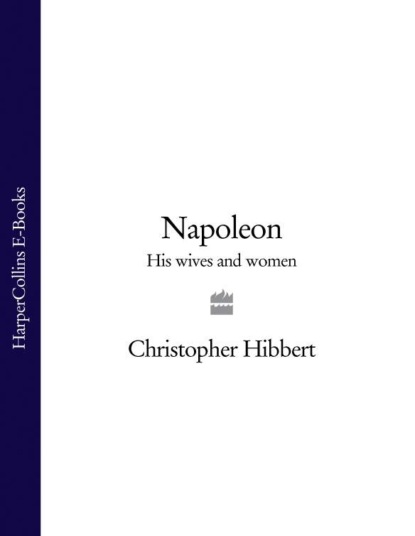По всем вопросам обращайтесь на: info@litportal.ru
(©) 2003-2025.
✖
Napoleon: His Wives and Women
Настройки чтения
Размер шрифта
Высота строк
Поля
These fortunes were bad, indeed. ‘Since my arrival I have seen nothing but fires, insurrections, assassinations,’ he reported to Napoleon, ‘and nothing can expel these fearful images from my mind…I am fighting here against the blacks, against the whites, even against my army which has lost its courage…Madame Leclerc is ill, but she is a model of courage and really worthy to be your sister.’
Leclerc was soon seriously ill himself and was nursed devotedly by Pauline who received a letter of encouragement and warning from Napoleon: ‘Remember that fatigue and difficulties are nothing when one shares them with one’s husband, and is useful to one’s country. Make yourself loved by your thoughtfulness, your affability and by conduct which is above reproach and never frivolous. We have some trunks of fashionable clothes packed up for you and the captain of the Syrene will bring them to you. I love you very much.’
Leclerc died – as Fréron had done – of yellow fever in November 1802. His wife cut off some tresses of her hair to place in his coffin and sailed home to France, spending much of the voyage alone in her cabin, mourning her loss, writing to Napoleon on New Year’s Day 1803, after an eight weeks’ voyage across the Atlantic: ‘I have arrived at Toulon after an appalling crossing with my health ruined. This is the least of my sorrows. I have brought back with me the remains of my poor Leclerc. Pity poor Paulette. She is thoroughly miserable.’
Her brother responded by granting her an allowance of sixty thousand francs a year which, together with the surprisingly large sum left by her husband, allowed her to live with satisfactory extravagance. On her return to Paris she stayed for some time convalescing in her brother Joseph’s house, before buying a neighbouring house, the Hôtel Charost in the faubourg St Honoré, for four hundred thousand francs. She was now also the owner of a château in the country, bought partly from the money she had persuaded her late husband to acquire, as opportunity offered in Italy, and she could be seen from time to time driving out from its porte-cochère in a flamboyant carriage, dressed in costumes as eccentric as her disjointed if amiable conversation. Once again she became the talk of the town: her rumoured venereal disease, her visits to clairvoyants, the interest she shared with her sister-in-law, Josephine, in tarot cards and in the interpretation of the patterns of egg whites dropped into glasses of water, the expensive clothes she bought from the dressmaker, Louis-Hippolyte Leroy, her dislike of Josephine, at whom she could be seen, as in the past, putting out her tongue, and the highly unusual remedies she employed for real, or more often imaginary complaints, including enemas containing the boiled intestines of farm animals – all these were favourite topics of Parisian gossip. So was her notorious reputation for sexual adventures with a variety of lovers who had included, even before her departure for Saint-Domingue, an actor at the Comédie Française, Pierre Lafon, and the marquis de Sémonville, a former Commissioner in Corsica. ‘I was one of her lovers,’ Sémonville told Baron Mounier, one of Napoleon’s secretaries. ‘There were five of us sharing her favours in the same house before she left for Saint-Domingue…She was the greatest hussy you can imagine, but also the most tempting.’ Jacques-Étienne Macdonald, an officer of Scottish descent who was to become a marshal and the duc de Tarente, certainly thought so: he spent three whole days with her in the bedroom of a house at Saint-Leu. He and two other officers all had affairs with her at the same time.
12 CAROLINE (#ulink_7ad79ef9-a4fa-5a66-a687-de0edc3e8145)
‘A small claw sometimes showed itself.’
NAPOLEON’S YOUNGEST SISTER, CAROLINE, a girl of fifteen in 1797, was at first prepared to behave in a friendly way towards Josephine, so much older than herself, and so responsive. At this time Caroline was a bright and pretty girl who had received a sound education at a school also attended by Josephine’s daughter, Hortense, the Institut National de St-Germain-en-Laye which had been founded by Mme Jeanne-Louise-Henriette Campan, an impoverished lady who had been employed at court as a reader to the daughters of Marie-Antoinette. The pupils, instructed in a variety of disciplines, skills and accomplishments, wore uniforms the colour of which denoted the forms in which the girls were placed. The curriculum was more varied than was usual in such establishments, and included lessons in such subjects as geography and grammar taught by a clergyman, as well as music and dancing, drawing, deportment and polite behaviour such as that formerly to be observed at Versailles where ladies had curtseyed when anyone sneezed.
‘I must tell you that she knows absolutely nothing,’ Napoleon had told Mme Campan when making arrangements for Caroline to be taken at the school. ‘Try to make her as clever as our dear Hortense.’ It was an exhortation, if repeated to the girls, not likely to ease the relationship between them. Nor was Mme Campan herself at all pleased when four grenadiers came clattering up to the school door late one evening with a message for Mlle Bonaparte from one of her brother’s generals. This general was Joachim Murat, the handsome, swaggering cavalry officer, thirty-two years old, the man who had seized the cannon at Sablons and brought them to the Tuileries gardens, thus enabling Napoleon to save the Convention.
He had been born on 25 March 1767 in a small village in the province of Guyenne, the youngest of the eleven children of a smallholder who also kept the village inn and posting station. He had been intended for the Church and had been granted a bursary to attend the Collège Saint-Michel. From there he had gone on to a Lazarist seminary at Toulouse, thus being given a far better education than had been available to his brothers. It was not long, however, before he decided that he had no vocation for the priesthood and, resolving to be a soldier, he had enlisted in a cavalry regiment in 1787.
His rise in the army had since been rapid. By May 1793, he was a major in the 16th Chasseurs, and by 1796, Napoleon’s aide-de-camp in the Army of Italy with which he served with notable dash and bravery. Wounded by a sabre cut on his arm at Mantua, he was later shot through the mouth, the bullet, as he told his father, going in through one cheek and out of the other without injuring his tongue or breaking a tooth.
Although Napoleon respected Murat as a dashing cavalry leader with an enviable capacity to judge the strength of enemy formations with remarkable accuracy, he was annoyed when he heard that the man, a mere innkeeper’s son with a strong provincial accent, wanted to marry his sister Caroline, a girl fifteen years younger than himself. She had been rather plain as a child, thin and pale; but she was now growing into an attractive young woman: there would come a time, he said, when sovereigns ‘might vie for her hand’.
‘She is a knowing little scatterbrain, with no thought for my position,’ her brother complained to Mme Campan. Murat was admittedly a brave man, but that was not enough. Napoleon said as much to Caroline herself. The man had a little learning, he conceded: he had, after all, ‘been raised as a priest’. But he had no real intelligence, just as he had no politesse. ‘One day,’ Napoleon told his sister angrily, ‘you’ll learn what it is to go to bed with a man who can’t control himself and find yourself alone with him, without your chemise and the man naked.’ He then added, ‘In the high position to which fortune has raised me, I simply cannot allow a member of my family to marry into one like that.’
But her eldest brother, Joseph, as head of the family, approved of the marriage. A marriage contract was consequently drawn up and Napoleon was prevailed upon to sign it; but he declined to go to the wedding which took place on 20 January 1800 at Joseph’s estate at Mortefontaine.
Once the matter had been settled, however, Napoleon decided to be accommodating; taking with him his two fellow consuls, Emmanuel-Joseph Sieyès, the churchman who drafted the new constitution, and Pierre-Roger Ducos, a compliant protéegée of Barras, he attended a ball given at the Ministry of the Interior by Lucien Bonaparte, the Minister, in honour of Caroline and Joachim Murat. Napoleon also provided the bride and bridegroom with a pleasant apartment in the cour des Tuileries at the Hôtel Brionne, while they also acquired an estate in the country at Villiers, overlooking the Seine opposite the Îie de la Grand Jatte, and another in the Deux-Sèvres for which they paid almost half a million francs (a sum they could well afford, Caroline having been given a handsome dowry and Murat having acquired a fortune from various dubious activities while serving in Italy).
They were clearly very happy. The comtesse de Chastenay wrote of the pleasant sight of Murat with his ‘sunburned face and black hair…holding the gloves and fan of the slim, white little creature’, his wife. Murat himself described Caroline as ‘the most adorable little woman’; yet, although so young, she had a determined will: another observer, Mme Lenormand, wrote of the ‘contrast of the rather childish grace of her face with the decisiveness of her character’.
Fond as they were of each other in the early years of their marriage, Murat was not faithful to Caroline, nor she to him. She dutifully bore his children; but it was not long before she embarked upon a series of affairs including, so Hortense de Beauharnais said, one with her husband’s aide-de-camp, the comte de Flahaut and, more passionately, with Metternich and also with Laure Permon’s husband, Andoche Junot, who came close to murdering his wife when he discovered that she, too, was conducting an affair with Metternich.
Hortense was ambivalent in her feelings for Caroline. She was a mistress, Hortense said, of the ‘art of attracting and charming…Admittedly a small claw sometimes showed itself…She was brave, determined and emotional, the charm which made one long to serve her could not conceal a lust for total domination…Nor could she hide her envy of anyone else’s success.’
According to Talleyrand, she had the ‘mind of Cromwell in the body of a pretty woman. Born with a most forceful character, she was as graceful as she was charming and attractive. But she could not conceal her passion for power.’
Her brother Napoleon recognized this passion as well as her commanding personality; and when, at the age of thirty-nine, Murat was created King of Naples, Napoleon told him, ‘With a wife like yours, you can always leave should a war induce me to summon you back to my side. Caroline is perfectly capable of acting as regent.’
The marriage of Caroline’s sister Pauline to General Leclerc had taken place in the Mombello oratory on the same day as that of her eldest sister, Elisa, to a thirty-five-year-old Corsican officer, Captain Felice Bacciochi. A man of no discernible personality or talent, he was considered to be the best match that the plain and rather bossy Elisa could hope to make and he was soon shipped off to no very demanding employment on the island of his birth.
While granting Elisa, as he granted Pauline, a generous dowry of forty thousand francs, Napoleon was thankful to be able to dispose of so dull and insignificant a brother-in-law, for his household at Mombello was already assuming the formality and dignity of a royal court.
Officers on Napoleon’s staff were now required to make courteous genuflections on encountering his mother or his wife or any of his sisters. Nor did these officers dine at the table of the General who had his meals served separately under the respectful gaze of visitors permitted to watch the meal in progress in the manner of those who had been permitted to watch King Louis XVI at table at Versailles.
On a visit to Mombello in June 1797 the diplomatist, comte André-Francois Miot de Melito, had expected to find an army headquarters but found instead ‘a brilliant court’:
Strict etiquette reigned round him [Miot de Melito said]…An invitation was an honour eagerly sought, and obtained only with great difficulty. Bonaparte was not in the least embarrassed by the excessive honours paid to him, but received them as though he had been accustomed to them all his life. His reception rooms and an immense marquee pitched before the palace were constantly filled with a crowd of guards, administrators, and the most distinguished noblemen of Italy who came to solicit the favour of a momentary glance or the briefest interview. In short, everyone bowed before the glory of his victories and the haughtiness of his demeanour. He was no longer the general of a victorious republic, but a conqueror on his own account, imposing his own laws on the vanquished.
Napoleon’s whole manner, indeed, had for some time now been far removed from that of the untidy, gauche young man whom Barras had introduced to Parisian society. His self-confidence, his conviction of a future guided by his ‘star’, were now complete. Miot de Melito described an encounter with him at Mombello during which Napoleon spoke uninterruptedly for two hours during a walk in the park. The comte described him as ‘a man of below average height with hair powdered and cut square and worn in an unusual way below his ears. His coat was buttoned to his chin…His brusque and animated gestures revealed both passionate feeling and profound thought. His speech was curt, and in those days very incorrect.’
Even so assertive a man as General Pierre Augereau, the son of a poor Parisian servant, whose rough manner was described as ‘loud and vulgar’, found him intimidating. ‘I don’t know why,’ he was once heard to murmur on emerging from the room which Napoleon used as a study at Mombello, ‘but the little bugger scares me.’ Napoleon also frightened General Vandamme who had shown remarkable bravery in the campaign of 1793. ‘I, who fear neither God nor the devil,’ Vandamme once declared, ‘am ready to tremble like a child when I approach him.’
In Josephine’s presence he conveyed a far less intimidating impression. Indeed, in the company of his wife, so tactful, so polite, courteous, self-assured and charming, he was capable of exercising, when he chose, a far from spurious charm himself.
13 ‘PEACE À LA BONAPARTE’ (#ulink_3a8f629d-d7c6-5651-91b3-82b042daf6b2)
‘The Italians may squeal a bit,
but that is of no consequence.’
AS CANNON OPENED FIRE in Paris at three o’clock in the morning of 4 September 1797, General Augereau, who had been sent from the Army of Italy by Napoleon for the purpose, led a force of some two thousand men into the Tuileries and arrested all the deputies who had won seats in the recent elections and had been summoned to an emergency meeting. Augereau then marched off to the Luxembourg, the palace built for Marie de Medici, to take into custody two Directors who were at odds with their radical colleagues – Lazare Carnot, the military engineer and former driving spirit of the Committee of General Defence, and Francois, marquis de Barfhélemy, a former minister plenipotentiary in Switzerland, who had been elected a Director only three months before. Barthélemy was surprised in his bed; Carnot managed to escape in his nightshirt. No fewer than sixty-three citizens were also arrested and deported in iron cages to the penal colony of Guiana, where many died of fever. Several newspapers were closed; laws were passed prescribing the death penalty for royalist émigrés returning to France without permission and for anyone plotting to restore the monarchy; while the recent elections, the results of which had been decisively anti-Jacobin, were annulled.
These results, reflecting the reactionary mood of the country, had persuaded the three radical Directors, Paul Barras, Jean-François Reubell and the lawyer, Louis-Marie de La Révellière-Lépeaux, Reubell’s ally and colleague, the fiercely short-tempered anti-Christian proponent of deism, to organize the coup d’état which was so efficiently and ruthlessly carried out by General Augereau. Once Augereau had carried out his task, these three Directors, with the collaboration of Charles Maurice de Talleyrand and Talleyrand’s friend, Germaine de Staël, set about planning the next stage of their coup.
The essential requirement for this was a general who commanded the respect of a large number of troops loyal to the republic and who was himself loyal to the Revolution. The most likely candidates were General Hoche and General Bonaparte.
But, at the age of twenty-nine, General Hoche died of what seemed to be pneumonia; so General Bonaparte, who had already given the radical Directors his assurance that he was prepared to support them by sending General Augereau to Paris, remained the man most likely to give the radical Directors and their allies the backing they needed. The day after the coup, he received a letter from Talleyrand, the recently appointed Minister of External Relations: ‘Paris is calm, Augereau’s conduct was exemplary. It is clear that he has been taught in the right school.’
For the moment, Napoleon was obliged to remain in Italy at Passeriano, the Doge’s summer residence outside Venice, impatiently endeavouring to conclude the peace treaty with Austria, biting his nails, uncharacteristically drinking too much, on occasions losing his temper or simulating ungovernable rage against the Austrian negotiator, Graf Ludwig von Cobenzl, threatening to deliver him up to French soldiers, smashing a valuable tea service on the floor, shouting that that was what was in store for the Austrian empire, declaring that it was just like ‘an old hag of a servant whom everyone in the house rapes’, storming out of the room and generally behaving, so Cobenzl reported, like a madman.
On other occasions, he tried cajoling rather than threats, and for this approach he called upon the ingratiating talents of his wife who had arrived at Passeriano having spent, so it seems, some time alone with Captain Charles before his departure from Milan on leave. Mme Bonaparte was ‘amiability personified’. She invited the members of the Austrian delegation to dinner parties; she arranged déjeuners à l’herbe in the surrounding countryside; she paid particular attention to Cobenzl, who gained the impression that her husband – exaggerating both the dignity of his own birth as a Corsican nobleman and her own aristocratic connections – regarded her with a certain Ehrfurcht. As though he wished to demonstrate that this was not the case, one evening at dinner, in the presence of both French and Austrian delegates, Napoleon began bombarding her with pellets of bread. But her look of reproachful annoyance soon put a stop to the embarrassing cannonade; and Napoleon, so it was observed, ‘hung his head and stopped’.
For all her gracious behaviour at the entertainments she provided for the delegates during the six weeks she spent at Passeriano that summer, Josephine was not happy there. She had heard a rumour that her lover, Captain Charles, was conducting an affair with an Italian lady. She had also been distressed to learn of Lazare Hoche’s death, and had been desparately worried that the letters which she had written to him might fall into the wrong hands.
(#litres_trial_promo) Also, she missed Paris and Paul Barras more than ever. ‘I can hardly wait to tell you of my affection for you,’ she wrote to him. ‘Write to Bonaparte to sign the treaty, and then I will soon be with my friends again…Goodbye…I love you with all my heart…Bonaparte sends you warmest greetings. He still adores me.’
At last, in the middle of October 1797, the terms of the treaty with Austria were ratified and peace was signed at Campo Formio, a village near Udine. The treaty preserved most of the French conquests in Italy and confirmed France’s possession of Austria’s Belgian provinces. It was also agreed that France should annex the territories it occupied on the left bank of the Rhine from Basel to Andernach. Austria, however, was given the Venetian territory east of the Adige River, including Istria, Dalmatia and the city of Venice.
This disposal of Venice, an independent state for over a thousand years, aroused widespread criticism, many believing that the so-called Peace of Campo Formio was a truce rather than an end to the war. It was, however, warmly welcomed in Paris where Napoleon’s prestige rose to new heights; and Talleyrand thought it as well to write the General a fulsome letter: ‘Now there is peace, peace à la Bonaparte. The Directory is pleased, the public overjoyed. The Italians may squeal a bit, but that is of no consequence. Farewell General and Peacemaker! My regards, admiration, respect, thanks – words fail me, the list could go on for ever.’
Josephine, no longer required in Italy, was now free to go home to France, as Napoleon himself did on 16 November. But first she decided to visit Venice where the news of its fate had not yet become general knowledge.
The Venetians, in the hope of appeasing her husband and in their eagerness to catch a glimpse of the famous General’s wife, crowded at the windows overlooking the Grand Canal and filled the swaying gondolas to watch her entry into their city, cheering her loudly as she floated by. For four days the city was en fête: a special performance was given for her at the opera; there was a ball at the Doge’s Palace; at night fireworks burst and flickered in the sky. Colonel Auguste Marmont, one of Napoleon’s aides-de-camp, was with her; so, it seems, was Captain Charles who soon had to leave immediately for Paris on Napoleon’s orders.
Evidently Charles accompanied her at least part of the way when she herself returned to Paris. Being in no great hurry to reach the end of her journey, she passed through towns decorated and illuminated in her honour, beneath triumphal arches, and was welcomed by speeches and proclamations, the roar of cannon and the cheers of the National Guard ringing in her ears. ‘My husband,’ she replied to the congratulations offered her, ‘has been so successful because he has had the good fortune to command an army in which every soldier is a hero.’
‘Mme Bonaparte is neither young nor pretty,’ wrote a cavalry officer who came across her at this time. ‘She has beautiful manners and is good-natured…She cries frequently, several times a day, for the most trivial of reasons.’
She took home with her not only the good wishes and congratulations of the people, but boxes packed with presents from Italians anxious to ingratiate themselves with the great French general, and with treasures she had herself purchased for her house in Paris, now being lavishly redecorated at great cost – pictures, statuary, Venetian glass, silks, bronzes and antique cameos. And, by her side in the rattling carriage, was a well-filled jewel box.
14 LIFE IN THE RUE DE LA VICTOIRE (#ulink_cbdeb15d-5dee-5b71-9cc2-1b7e538adbab)
‘I fear that one day we may have to implore him
to tear himself away from his studious retreat.’
UPON HIS RETURN TO THE HOUSE in the rue Chantereine, soon to be renamed the rue de la Victoire, Napoleon was shocked to find how much money had evidently been spent on his wife’s orders in their absence. The bills awaiting them were enormous: she had employed the cabinet-makers, Jacob Frères, sons of the celebrated menuisier, Georges Jacob, and had sent them one hundred and twenty thousand francs on account with instructions to make the place ‘supremely elegant’; and pieces of furniture continued to arrive almost daily.
Astounded as he was by the money that had been spent, Napoleon had little cause for concern. It has been estimated that he had extorted fifty million francs in Italy, scarcely ten million of which had been sent to the Directory; and while the sums spent on the house in the rue Chantereine were extravagant enough, he was one day to have as many as forty-four palaces, the furniture in one room of one of the palaces costing more than the one hundred and twenty thousand francs sent to the Jacob frères for the pieces they now supplied.









